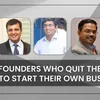Science, management, startups – Bangalore Business LitFest provides a treat of books and authors
From politics to publishing, speakers at the Bangalore Business Literature Festival share a wide range of insights for entrepreneurs and leaders.
The seventh annual Bangalore Business Literature Festival (BBLF) will be held online on September 21-23 this week. YourStory is the media partner for BBLF; see our coverage of earlier editions in 2020, 2019, 2018, 2017, 2016, and 2015.
See also YourStory’s Book Review section with reviews of over 320 titles, and our compilation of 85 Quotes on World Book Day.
Our earlier five preview articles addressed startup advice, failure recovery, business resilience, reader patterns, and creativity tips. In this article, the authors discuss trends in Indian science, business writing, opportunities for entrepreneurs, and better management practices.

Indian science
“It has become hard for the public to appreciate the value of science in a national context. Science is so advanced these days that the public hardly gets to know what happens in the country’s labs,” observes Hari Pulakkat, author of Space. Life. Matter: The Coming of Age of Indian Science, and editor of science and technology magazine IITM Shaastra.
This lack of knowledge has implications for the country as public understanding influences policy in the long run. “So, the central challenge of Indian science, as in any country, is to get the public and its leaders to appreciate the value of science,” he adds.
The second challenge is money. “India is a resource-constrained country and so needs to spend money wisely. The first challenge – distance from the public – is therefore tied to the second, because a careful understanding of science is necessary to make decisions on what to fund,” Hari explains.
These two aspects have affected the progress of Indian science. “Yet, considering the money spent on education and research, India has done very well,” he says.
“India is among the top five nations in terms of research output, and it excels in some select areas. However, the overall quality of research (if you remove a few top institutions) is still quite low,” Hari laments.

Pandemic impacts
The ongoing coronavirus pandemic has had a devastating impact on the health and economies of nations around the world.
“We learned a lot about ourselves and alternate ways of living and working during the pandemic,” observes Keel Hunt, author of The Family Business: How Ingram Transformed the World of Books. The lockdowns led to many routines of life becoming more personal.
“Choices were more limited, and we all became more interested or even dependent on how publishers, booksellers and authors did their work in service to society. Many players in the book trade responded well to these challenges,” Keel adds.
“I believe we found that humans are much more resilient than anyone believed possible,” he says.
“The pandemic has taken a lot of money out of the system and so there will be pressure on the government to cut funding in science. But, on the other hand, the pandemic has led to a realisation that science is important to our future,” Hari Pulakkat adds.
“We will have to and see whether this realisation will lead to increase in funding overall or only in some areas like healthcare,” he observes.
The pandemic has also led to two other contradictory trends. “The first is the feeling that India needs to stand on its feet in science and technology. The second is the need to cooperate with other countries in science to solve big problems. We have to again wait and see how these two tendencies will influence each other,” Hari explains.

Management and leadership
Four authors address the changing face of leadership, demographics, and technology impacts.
“The leaders of successful companies, of any size really, must be thoughtful leaders of people, as well as innovators of products and services. This fact is real at any stage of development,” observes Keel Hunt.
“As we learn from the Ingram story, the “intrapreneur” especially must be both a risk-taker and a person capable of keeping the dream alive. Ingram’s Lightning Source, the print on demand innovator, is an especially good example,” he adds.
“The most common misconception about organisational politics is adopting a victim mindset – They did this to me,” explains Bhavna Dalal, Founder and CEO of Talent Power Partners, and author of Checkmate Office Politics.
“My attempt has been to get people to see what is it about you that allowed others to do it to you, and transform or remould that such that you don’t allow that pattern to be repeated,” she adds.
“Another misconception is that I am virtuous because I stay away from politics. However, to tackle something you need to know it and understand it. If you label “politics’ as bad, you will never get close to handling it,” Bhavna says.
The growing base and power of millennials is a key trend in business, society and politics. “Leaders should really focus on talking and listening to millennial employees. Millennials, mostly, do not feel heard right now,” observes Vivan Marwaha, user researcher and author of What Millennials Want: Decoding the Largest Generation in the World.
“The policies they need are not different from what other generations would have liked, but it is really important to actually engage in a meaningful dialogue with millennial employees instead of imposing top-down policies,” he advises.
“Everyone struggles to manage between life and technology. This is a continuous journey and is actually harder for millennials since they are far more networked and therefore constantly interrupted or impacted by others,” observes Rishad Tobaccowala, author of Restoring the Soul of Business: Staying Human in the Age of Data.

Customers and fans
In addition to internal changes, external shifts have led companies to reinvent the way they engage with customers.
“Fandom is the avenue that companies can use to reach their customers in that genuine human way,” explains David Meerman Scott, author of The New Rules of Marketing and PR and Fanocracy: Turning Fans Into Customers and Customers Into Fans.
“Instead of shouting the loudest with ads that most people will ignore, fandom allows companies to reach people’s hearts—through what they love or care about. That connection will last longer than any traditional online marketing campaign,” he adds.
This is now more important than ever because everyone is feeling the chaos of digital communication. “The social media boom has happened, and we have gotten so used to ignoring the ads on Facebook or Instagram,” he observes.
“We have grown tired of influencers who seem fake, and all we want is to connect with friends and family. What we want more than ever is genuine human connection,” David says.

Entrepreneurship frontiers
The 'triple helix' of partnerships between academia, industry, and government is regarded as key to boost India's entrepreneurship ecosystem.
“There are no clear rules or procedures here. Partnerships between the three have to evolve naturally, as more scientists feel the need to spin-off companies based on their work. As their number increases, startups are likely to be the bridge between academia and industry,” Hari observes.
In addition to the tech side, there is also a boom in cultural entrepreneurship. Kaninika Mishra, author of The Indic Quotient: Reclaiming Heritage Through Cultural Enterprise, points out that the ventures and initiatives in her book are not just businesses.
“They are preserving and promoting indigenous ideas from our unique and timeless heritage and thus contributing to India's soft power. It is often assumed that soft power diplomacy is a national level endeavour, but in their own way, these entrepreneurs and activists have helped positively influence and shape the perception about India,” she emphasises.
Keel Hunt also offers tips for aspiring entrepreneurs. “Understand that your dreams are important – in fact, they are vital not only to your personal financial success but also, in some cases, to your national culture. This is especially true for people engaged in the world of books,” he advises.

Business writing
“Business books account for a big chunk of the non-fiction category,” observes Tony V Francis, author of the novel The Autograph Seeker, and Chief Revenue Officer, Matrix Publicities(WPP).
As categories in this space, he points to biography, history, marketing, sales, business culture, human resources, small business, entrepreneurship, job hunting, careers, management, leadership, and skills.
“There is also the trending and important Women and Business category, and Inclusiveness in the Workplace. Business professionals are writing like never before and it is not only to capture experience and expertise,” Tony adds.
This business writing is taking place because of the opportunities it opens up. “It helps in gaining thought leadership in the industry, helps one’s business, gets media attention, and engagements for keynotes and paid speaking,” Tony explains.
“A published business book that has something compelling to say can also become a powerful business and brand-building tool. Professionals have realised it,” he says.
“Desired distribution may be a challenge for first-time authors, but publishing is not. For established writers, as long as people want to gain a fair amount of knowledge and be inspired, their audiences will only grow,” Tony affirms.
He also describes three key elements of a good business book – people, problems, and potential solutions. “Writers should be clear who they are after. They should clearly state the challenge the reader has and the downside it creates for the reader,” he describes.
The author should indicate that there is a possible solution to that problem. “Can the book give resolution to that specific problem? You may not want it to be on an expansive subject like leadership in the workplace. Ideally, it should be more specific, such as a book that helps frontline trainees become leaders,” Tony advises.

Festival highlights
With 34 speakers featured in 13 sessions spread across three evenings, BBLF offers a wealth of insights by authors in a diverse range of fields.
“The Bangalore Business Literature Festival and The Bangalore Literature Festival are very close to my heart. I became a part of the lit ecosystem because of these two culturally relevant festivals that have been drawing the best minds from around the world,” Tony V Francis explains.
He volunteered for an earlier edition of BBLF and attended a workshop on screenplay writing by Anjum Rajabali. “I was then on my maiden novel, The Autograph Seeker. Rajabali is one of the best screenwriters in the country and he drove home the concept of serving one’s apprenticeship as a writer,” Tony recalls.
BBLF has a range of unique sessions this year. “Indian business writing is dominated by a few authors, and R Gopalakrishnan is right on top,” observes Benedict Paramanand, Co-founder of BBLF and author of CK Prahalad - The Mind of the Futurist.
In his career spanning nearly half a century, holding senior leadership in HUL and the Tatas, Gopal has published 16 books. “Conversation with him at BBLF will be to learn how to be a prolific writer even while holding a top job, and why he picked the range of topics he did,” Benedict describes.
Very few people know how a “deep state” works. “Businesses are intrinsically part of it. Investigative journalist Josy Joseph will discuss his new book The Silent Coup with author Mihir Sharma,” Benedict adds.
Rama Bijapurkar, thought leader and expert on marketing and branding in India, will end the festival by reflecting on the evolution of Indian business writing and the new challenges it faces.
Edited by Kanishk Singh












